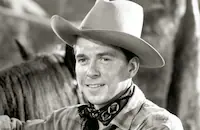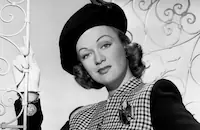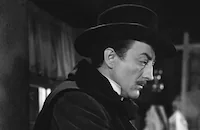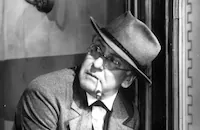One for the Book

Brief Synopsis
Cast & Crew
Irving Rapper
Ronald Reagan
Eleanor Parker
Eve Arden
Wayne Morris
Kent Smith
Film Details
Technical Specs

Synopsis
Flighty New York actress Sally Middleton is in love with love. When theatrical producer Kenneth Bartlett gently breaks off their affair in the winter of 1944, a broken-hearted Sally vows that she will never fall in love again. Sally's friend, actress Olive Lashbrooke, takes a different approach to romance. For her, love is a game, and the more players the better. Several months after the end of Sally's affair, Olive arranges to meet her current love interest, Sgt. Bill Page, at Sally's apartment. While she is waiting, Olive calls for her messages and learns that Comm. Ned Burling, a higher-ranking admirer, is in town for one weekend only. Choosing the commander over the sergeant, Olive pretends that Ned is her estranged husband and stands Bill up. To no avail, Bill tries to get another date and finally invites Sally to dinner next-door at the same romantic French restaurant that she frequented with Kenneth. While Bill and Sally are eating, Olive arrives with Ned, but hastily retreats when she spots them together. Later, Olive, whose memories of Ned have turned out to be better than the reality, telephones Sally to question her about Bill. By the time Sally finishes her call, Bill has fallen asleep. Because it is late and raining and difficult to find a room in the city, Sally offers Bill her couch, and he gratefully accepts. The next morning, when Bill awakens, Sally has left for an audition. She gets the part and tries to telephone Bill to explain that the playwright is reading the play to her. He, however, does not answer the phone for fear that his presence in her apartment will damage her reputation. Her eagerness to return to Bill is so distracting that the playwright sends her home. Overnight, spring arrives, prompting Bill to quote a passage from the Bible about "the voice of the turtle." When Sally complains that turtles do not have voices, Bill explains that the passage refers to the turtledove, a sign of spring. Later, Bill asks Sally to get tickets for the latest hit musical, which Kenneth produced. Sally is reluctant to call Kenneth, but after Bill kisses her, she overcomes her qualms and is able to obtain two house seats. Olive and Ned are also at the play. Feeling secure with Bill, Sally is able to be friends again with Kenneth. That night, Bill again plans to stay with Sally, but when she explains that she has given up on love, he leaves for a hotel, after telling her that he loves her. The next morning, Olive telephones Bill at the hotel, and when he does not answer because he has already left for Sally's, she suspects that he has spent the night with Sally and hurries over to confirm her suspicions. Through a ruse, Bill contrives to convince Olive that he arrived after she did. Olive then invites him to lunch and dinner, but he turns her down. Later, Sally is called to rehearse with the lead in her new play. She returns home to find her apartment filled with flowers. Later, Bill asks her to marry him. After Sally admits that she loves him, they sit down to eat the dinner Bill has ordered from the restaurant next door.

Director

Irving Rapper
Cast

Ronald Reagan

Eleanor Parker

Eve Arden

Wayne Morris

Kent Smith

John Emery

Erskine Sanford
John Holland
Nino Pipitone
Frank Wilcox
Ross Ford
Bunty Cutler Girl At Telephone
Dick Bartell Ticket Agent
Jack Lee
Doris Kemper
Nicodemus Stewart
Ernest Anderson
Janet Warren
Tristram Coffin
Lois Austin
Philip Morris
Alan Foster
Brian O'hara
Joan Lawrence
Juanita Roberts
Peter Camlin
Suzanne Dulier
Bernard Deroux

Douglas Kennedy
Noelle Delorme
Francine Bordeaux
Darlene Mohilef
Norma Fenton
Peter Gowland
Robert Spencer
Helen Wallace
William Gould
Sarah Edwards
Crew
Harry Barndollar
Richard Barr
Murray Cutter
John Van Druten
Edwin Du Par
Rudi Fehr
Leo F. Forbstein
Les Guthrie
Robert Haas
Charles Hoffman
Charles Hoffman
Stanley Jones
William Kuehl
James Leicester
Sol Polito
Leah Rhodes
Max Steiner
Perc Westmore

Videos
Movie Clip




Trailer
Film Details
Technical Specs

Articles
One for the Book (1947) - One for the Book (aka The Voice of the Turtle)
The story opens in 1944 with Sally Middleton being dumped by her long time lover, Kenneth Bartlett (Kent Smith). He's married and is afraid Sally's ruining the affair by falling in love with him. He lets her down gently and Sally, highly prone to broken hearts, spends the next few weeks mourning her loss. That is, until she runs into her old friend Olive (Eve Arden) who's got a date with Bill Page, a Sergeant serving overseas, in New York on furlough. Olive wants to see Sally's new apartment and calls Bill's service to tell him to meet her there. In the meantime, at the apartment, another lover from overseas, also in town, calls up and Olive decides he's the better deal and stands up Bill for the night. That leaves Sally to awkwardly entertain him while Olive sees her other man.
The surprising thing about the movie is how effortlessly it combines hijinks with wit and frank discussion. Oh, the discussions aren't as frank as anything in the play but the ideas remain intact. Sally is afraid that she falls in love too easily and was taught to not make love to a man until she was married, but does anyway. In a very clever scene, she discusses this with Olive and uses the phrase "making love," commonly used before the seventies to mean wooing and courting, in a very slippery way, aided by Arden's arched eyebrows. The terminology still means wooing but the implication hints at something more physical.
In fact, for much of the movie, it's the implications of things that concern both Sally and Bill. Both have been hurt by love in the past and both are mindful of how it can happen again. Stifling them more than their own past, however, are their concerns about what people might think. On the first night they meet, Bill sleeps over, on the day bed of course. In a deli later, as they talk about it, the patrons get the wrong idea. And when Olive shows up when Bill and Sally are having breakfast together, they go into a mad scramble to hide the fact that Bill was ever there, despite there being nothing wrong with their relationship in the first place. (Reagan and Parker handle physical comedy in this sequence extremely well).
The dialogue is both witty and sincere and it's no mystery why it was such a huge hit on Broadway but the real treat of the movie is Eleanor Parker. Parker is probably best known today for playing the cold and impersonal Baroness in The Sound of Music (1965) and so it would be surprising to fans of that movie to see her play vulnerable and sweet so well here, although it wouldn't surprise anyone familiar with Parker's talent. She was called the "Woman of a Thousand Faces" for her incredible range of performances over the course of her career but despite three Oscar® nominations, she never took home the top prize.
Top billing goes to Ronald Reagan in a performance that probably ranks as one of his most comfortable. He plays Sergeant Bill Page as a kind soul with a quick wit and a gentle delivery. Reagan didn't get a lot of A list pictures but his casual ease with romantic comedy signals a career that could have taken off with only a few different choices.
Eve Arden is, as always, a delight, both brilliant and sharp, stealing every moment of every scene she inhabits. Arden had a gift for playing sardonic that few could match and it would go on to serve her well in the popular radio sitcom, Our Miss Brooks, starting in 1948. Four years later, the show was brought to television and Arden became one of the medium's first major stars.
Irving Rapper directs the adaptation with a sure hand, befitting the director who became known for his skill with adaptations. From One Foot in Heaven (1941) and Now, Voyager (1942) to The Corn Is Green (1945), The Glass Menagerie (1950) and Marjorie Morningstar (1958), he always seemed to be directing an adaptation from a play or novel and it's a skill that's not to be underestimated. Taking a play that essentially stays in one apartment for its entirety, Rapper moves the action around and keeps the camera from sitting in the corner, motionless. And the actors help. Eleanor Parker's alternately sweet and troubled face alone keeps the visuals as interesting as they need to be.
One for the Book, aka, The Voice of the Turtle, still enjoys success on the stage today in regular revivals, both nationally and in local community theaters. And the film still entertains, proving that a play about sexual mores in the 1940s still has something to say in today's world. It also proves, once again, that Eleanor Parker was a great actress, a "Woman of a Thousand Faces" indeed.
Director: Irving Rapper Screenplay: John Van Druten, Charles Hoffman Producer: Charles Hoffman Original Music: Max Steiner Cinematography: Sol Polito Film Editing: Rudi Fehr Art Direction: Robert M. Haas Set Decoration: William L. Kuehl Costume Design: Leah Rhodes Cast: Ronald Reagan (Sergeant Bill Page), Eleanor Parker (Sally Middleton), Eve Arden (Olive Lashbrooke), Wayne Morris (Comm. Ned Burling), Kent Smith (Kenneth Bartlett), John Emery (George Harrington), Erskine Sanford (Storekeeper), John Holland (Henry Atherton)
By Greg Ferrara
SOURCES: Wikipedia IMDB

One for the Book (1947) - One for the Book (aka The Voice of the Turtle)
Quotes
Trivia
Notes
The cast of John van Druten's original play comprised only three characters: "Sally," "Bill" and "Olive." The play was still running on Broadway when the film opened. According to a April 19, 1946 Hollywood Reporter news item, Jean Arthur was first offered the lead in the picture. Margaret Sullavan, who starred in the Broadway production, was also tested, according to an August 8, 1946 Hollywood Reporter news item. A February 23, 1947 New York Times news item reports that van Druten was to have directed the film, but chose not to, and that the play's Broadway producer, Alfred de Liagre, who was to produce the film as well, left the project because of casting disagreements. According to information included in the MPAA/PCA file on the film at the AMPAS Library, PCA director, Joseph I. Breen obected to John van Druten's play as "a story of illicit sex, without sufficient compensating moral values." In a June 3, 1946 letter to Warner Bros. executive Jack L. Warner, Breen advised that "in order to bring this story within the provision of the Production Code, it will be necessary affirmatively to establish that there has been no illicit sex affair between Bill and Sally." The film was shown on television under the title One for the Book.

Miscellaneous Notes
Released in United States Winter February 21, 1948
Released in United States Winter February 21, 1948














